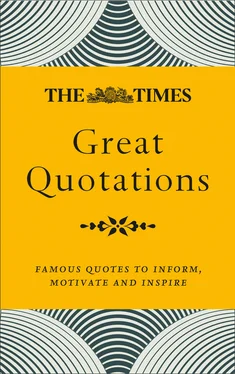[On becoming prime minister during the Second World War]
Sir Winston Churchill, prime minister of the UK, historian and Nobel Prize winner (1874–1965)
Just say the lines and don’t trip over the furniture.
Sir Noël Coward, English playwright (1899–1973)
•
Television has brought back murder into the home — where it belongs.
Alfred Hitchcock, English film director (1899–1980)
•
If in the first act you have hung a pistol on the wall, then in the following one it should be fired. Otherwise don’t put it there.
Teatr i iskusstvo (1904)
Anton Chekhov, Russian playwright and short-story writer (1860–1904)
•
The structure of a play is always the story of how the birds came home to roost.
Shadows of the Gods (1958)
Arthur Miller, American playwright (1915–2005)
•
The basic essential of a great actor is that he loves himself in acting.
My Autobiography (1964)
Charlie Chaplin, English comic actor, director and composer (1889–1977)
•
Without wonder and insight, acting is just a trade. With it, it becomes creation.
The Lonely Life (1962)
Bette Davis, American actress (1908–1989)
•
You spend all your life trying to do something they put people in asylums for.
Jane Fonda, American actress (1937–)
•
Acting should be like punk in the best way. It should be a full-on expression of self – only without the broken bottles.
Uncut (2000)
John Cusack, American actor (1966–)
•
Playing Shakespeare is very tiring. You never get to sit down, unless you’re a king.
Josephine Hull, American actress (1877–1957)
•
Acting is a masochistic form of exhibitionism. It is not quite the occupation of an adult.
Time (1978)
Laurence Olivier, English actor (1907–1989)
•
A painter paints, a musician plays, a writer writes – but a movie actor waits.
A Life on Film (1967)
Mary Astor, American actress (1906–1987)
•
Acting is standing up naked and turning around slowly.
Life Is a Banquet (1977)
Rosalind Russell, American actress (1907–1976)
•
Being another character is more interesting than being yourself.
Sir John Gielgud, English actor (1904–2000)
•
The art of acting consists in keeping people from coughing.
Sir Ralph Richardson, English actor (1902–1983)
Official dignity tends to increase in inverse ratio to the importance of the country in which the office is held.
Beyond the Mexique Bay (1934)
Aldous Huxley, English writer and philosopher (1894–1963)
•
Most human beings have an almost infinite capacity for taking things for granted.
Themes and Variations (1950)
Aldous Huxley, English writer and philosopher (1894–1963)
•
It is always easier to fight for one’s principles than to live up to them.
Alfred Adler, Austrian psychologist and psychiatrist (1870–1937)
•
Man is so made that he can only find relaxation from one kind of labour by taking up another.
The Crime of Sylvestre Bonnard (1881)
Anatole France, French poet (1844–1924)
•
A man’s mind will very generally refuse to make itself up until it be driven and compelled by emergency.
Ayala’s Angel (1881)
Anthony Trollope, English writer (1815–1882)
•
I have taken great care not to laugh at human actions, not to weep at them, nor to hate them, but to understand them.
Tractatus Politicus (1677)
Baruch Spinoza, Dutch philosopher (1632–1677)
•
Men who are unhappy, like men who sleep badly, are always proud of the fact.
The Conquest of Happiness (1930)
Bertrand Russell, British philosopher, mathematician, historian, and writer (1872–1970)
•
One of the symptoms of approaching nervous breakdown is the belief that one’s work is terribly important, and that to take a holiday would bring all kinds of disaster.
In Praise of Idleness and Other Essays (1935)
Bertrand Russell, British philosopher, mathematician, historian, and writer (1872–1970)
•
The pendulum of the mind oscillates between sense and nonsense, not between right and wrong.
Memories, Dreams, Reflections (1962)
Carl Jung, Swiss psychologist (1875–1961)
•
The shoe that fits one person pinches another; there is no recipe for living that suits all cases.
Modern Man in Search of a Soul (1933)
Carl Jung, Swiss psychologist (1875–1961)
•
Where we have strong emotions, we’re liable to fool ourselves.
Cosmos (1980)
Carl Sagan, American astronomer and educator (1934–1996)
•
My life is spent in a perpetual alternation between two rhythms, the rhythm of attracting people for fear I may be lonely, and the rhythm of trying to get rid of them because I know that I am bored.
The Observer (1948)
CEM Joad, English philosopher (1891–1953)
•
Any man may be in good spirits and good temper when he’s well dressed. There ain’t much credit in that.
Martin Chuzzlewit (1844)
Charles Dickens, English writer and social critic (1812–1870)
•
Every one says forgiveness is a lovely idea, until they have something to forgive.
Mere Christianity (1952)
CS Lewis, British literary scholar and writer (1898–1963)
•
Pleasure is a thief to business.
The Complete English Tradesman (1726)
Daniel Defoe, English trader, writer and spy (1660–1731)
•
The heart of man is made to reconcile the most glaring contradictions.
Essays and Treatises on Several Subjects (1753)
David Hume, Scottish philosopher (1711–1776)
•
Every time you open your wardrobe, you look at your clothes and you wonder what you are going to wear. What you are really saying is, “Who am I going to be today?”
The New Yorker (1995)
Fay Weldon, English feminist and playwright (1931–)
•
Everyone thinks his own burden is heavy.
French proverb
•
The smyler with the knyf under the cloke.
The Knight’s Tale (1387)
Geoffrey Chaucer, English poet (c. 1343–1400)
•
Our deeds determine us, as much as we determine our deeds.
Adam Bede (1859)
George Eliot, English writer (1819–1880)
•
Our actions are like ships which we may watch set out to sea, and not know when or with what cargo they will return to port.
The Bell (1958)
Iris Murdoch, Irish writer (1919–1999)
•
The world can only be grasped by action, not by contemplation … The hand is the cutting edge of the mind.
The Ascent of Man (1973)
Jacob Bronowski, British-Polish mathematician and science historian (1908–1974)
Читать дальше












